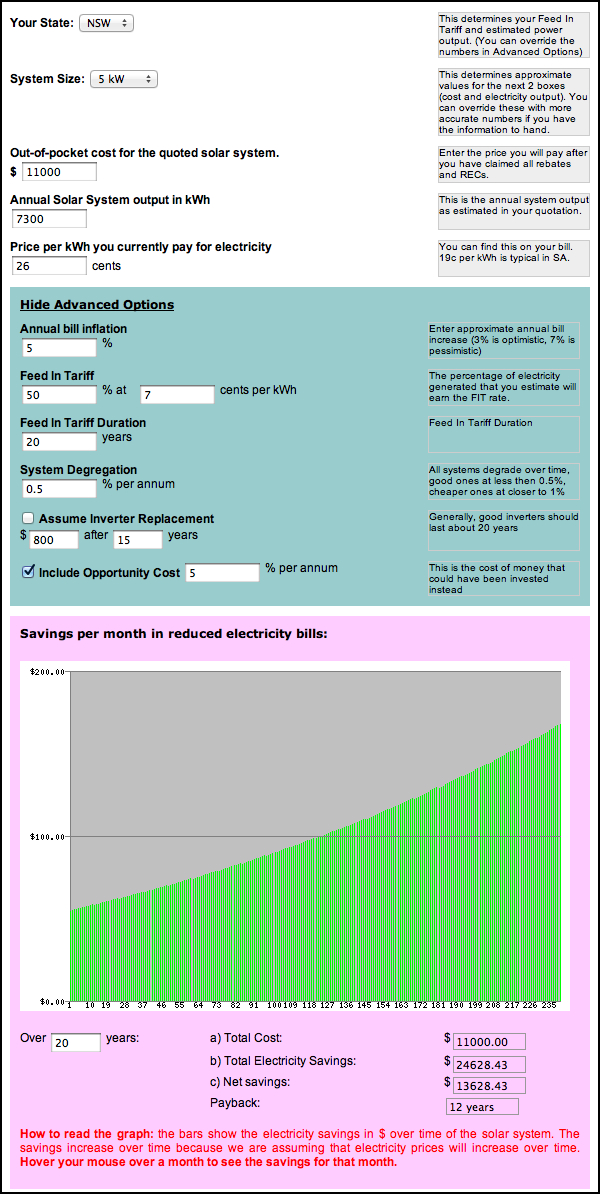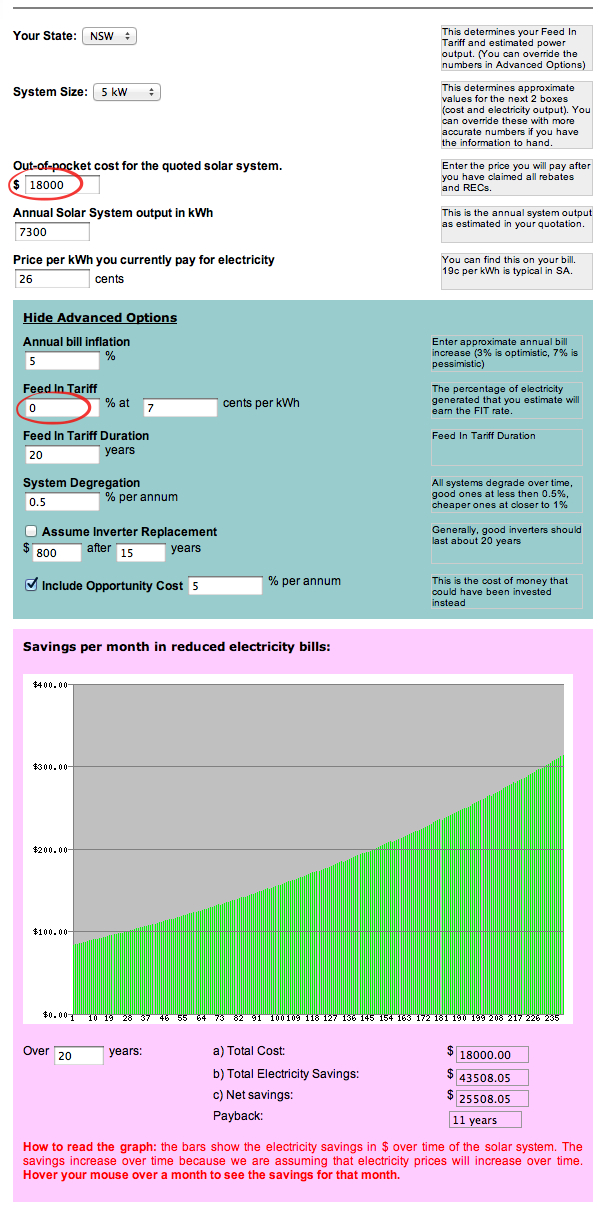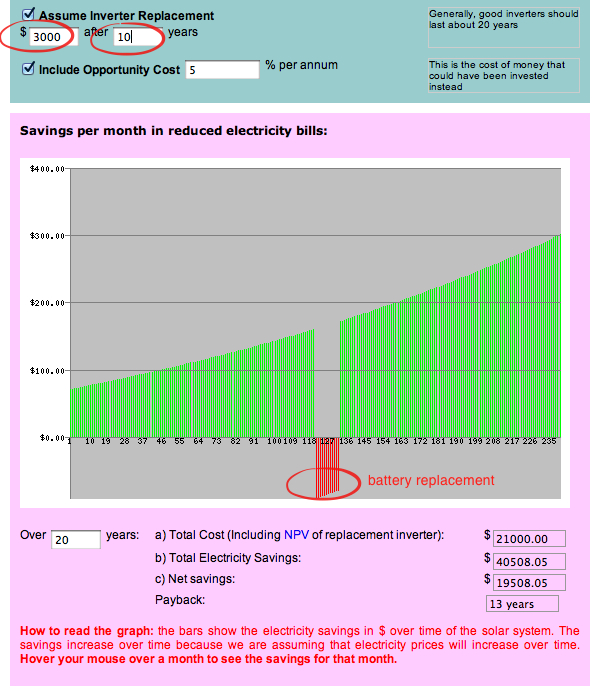Note: This post was written in 2012 and is way out of date. For the latest payback figures please read this page which is kept up to date >>> Are Solar Batteries Worth It
In my previous 2 posts I looked at the concept and design of Hybrid Solar systems.
The main conclusion of those 2 articles was that
a) Hybrid solar rocks!
b) But you gotta pay for it!
So the question this post will try to answer is:
How Much Extra Does Hybrid Solar Cost?
and bearing in mind the extra costs:
What is the payback of Hybrid Solar Compared To Regular Grid Connect Solar?
So let’s look at the cost of a quality 5kW system and then see what it costs to upgrade it to “Hybrid”.
Cost of a 5kW grid connect system (April 2011 pricing) :
5kW of good quality panels: $8,000
5kW inverter: $3,000
Racking and cabling: $1,000
Install: $2,000
Less Solar Credits (approx 165 STCs @ $25): -$4,000
Total cost: $11,000
Cost of a 5kW Hybrid solar system:
5kW of good quality panels: $8,000
5kW inverter: $3,000
Power management unit: $3,000
Batteries (to store 10kWh): $3,000
Racking and cabling: $2,000
Install: $3,000
Less Solar Credits (approx 165 STCs @ $25): -$4,000
Total cost: $18,000
So, for a 5kW system – expect to pay at least $7k more for the hybrid option.
So the question is – if you are going hybrid to avoid a miserable Feed In Tariff, like NSW’s 7c per kWh – then what is the payback on the extra expense?
Let’s crunch the numbers using my solar payback calculator:
Scenario 1 – Grid Connect System:
Key assumptions are : we export 50% of our solar power @ 7c per kWh, and we offset our electricity bill @ 26c per kWh with the other 50%.
(Read this article If you are confused about importing and exporting solar electricity)
The calculator looks at the cash-flow of this solar system for 20 years. It takes into account:
- electricity price inflation
- the “opportunity cost” of not having the cash you paid for the solar system in the bank earning interest instead
- power degradation over time as the panels age
For a system cost of $11,000 here are the results:
The payback of the 5kW grid connect system is 12 years when exporting half your power for a pitful 7c per kWh.
Scenario 2: 5kW Hybrid System.
The 5kW hybrid system comes with about 10kWh of battery storage. A 5kW system produces about 20kWh per day. So it should be capable of storing and shifting the 50% of the solar power that was previously being exported. We can use that power to offset our 26c per kWh bill instead. If this was to happen what would the payback be on the hybrid system?
To find out, I simply changed the price of the system to $18,000, and changed the % of electricity being exported from 50% to 0%. Here are the results (with the changes to the calculator inputs highlighted):
With those (very big) assumptions, the payback comes out at 11 years! Hybrid solar appears to be a better investment…woo hoo!
But.. it isn’t that simple I’m afraid…my experience is that the batteries in such a system will need replacing after about 10 years.
Luckily our calculator can handle that. I originally programmed it to include the option of replacing the inverter after a number of years. If we use this option to show us the effect of replacing $3,000 of batteries after 10 years, then the payback comes out at 13 years. One year longer than the non-hybrid system:
So in this example – assuming the batteries last 10 years, and cost you $3,00 to replace (many people would argue that batteries will reduce in price drastically in 10 years), your hybrid system is a slightly worse investment that non-hybrid.
But I’ve made a hell of a lot of assumptions:
- about how much electricity is exported
- what the feed in tarrif will be 10 years in the future
- how much electricity prices will rise
- etc, etc.
The long and short of it is that – the extra cash you spend on a hybrid system should pay for itself over about 10 years if the feed in tariff in your state is (and stays) very low. Combine that with the advantages of blackout protection, and the satisfaction of not giving almost-free electricity to the retailers and hybrid solar starts to look tempting. And as battery costs and the cost of the power management units come down, it is only going to become more viable.





 RSS - Posts
RSS - Posts



Hi Finn
Could you explain how the grid connect panels work with the batteries? Grid connect panels I think are normally around 45V and off grid ones 12V or 24V. Does this mean you need the same Voltage batteries as that stated for the panels? Jaycar said I couldn’t connect 45V panels to a 24V battery bank, but I wondered if you can put a converter between the panels and battery bank. I am interested as we are in a remote location and will have to set up an off-grid system. I wondered if we could buy normal grid connect panels (they seem so much more affordable), connect them to the batteries, and then have an inverter to to provide us with 240V. I’m new to understanding volts and amps and am absolutely mystifed. I’m also completely confused by Ah and why I would need a 600Ah battery system compared to a 1600 Ah one. I’m also mystified as why off-grid systems seem to use 2V batteries connected rather than 12V straight up. Can you help explain or direct me to a good site that sets all this out so I can learn? Ta.
Hi
We are currently considering solar as our electricity bills are huge. We live in a regional area, have biocycle running 24/7, plus a very large fish tank. We have been looking at a 7kw system and the quote we have for that is close to the quote for the 5kw system here. Where do we find someone who can supply and install the power management unit to get the hybrid system up and running? This sounds exactly what we need in our dream solar system. We also have quite a few black outs around here so the back up power would be brilliant.
thanks
Lauren
i am considering installing a hybrid system at my pump site at El Arish F.N.Q 4855 I am on time of use 9pm—7am @11.5 c/kw 7am—9pm @32.6c/kw. i run a2.2kw sub +1.6kw booster 23 hours/day 300 days/year. fit is 8c do you think this would be a viable proposition &could you recomend an installer?
Please advise if I can obtain working copies of the various work sheets.
Thanks
Hi Finn
Looking at your calculations it seems the cost of the 5Kw grid connect system is $10000 not the $11000 you then extrapolate from [I realise prices have changed since then but it does affect the basic comparison]. Any idea what the current prices of batteries and the power management system might be?
Cheers – Steve
Finn, an earlier comment of yours praised the Aussie Selectronics SP PRO. It didn’t make the cut in your hybrid systems. I realise it is pricey, but if feasible would like to include some local product in my system planning.
A nOOb in this area, is it just a smart inverter, and does it combine some of the features that your exemplar systems require separate devices for?
As a brief guide, I will be going for a 5Kw or 8Kw system. Why?
High End Sound System + HD Projector. Home all day, so listen and watch in daytime hours for most of the time. Also in an SP-Ausnet area, so want to get max feed in $$, even if at $0.08 Kw/h.
TIA
T
Hi Finn,
Firstly, outstanding website, and great information!
Can you please advise if there has been any reduction in costs for the additional equipment to make existing solar systems in to Hybrid Solar.
Do you know of any new equipment on the market compared to those you referred to back in 2012?
Our current power cost 31.11 cents per kWh, we have a 6.5 kW system. We use approx 33 kWh /day during winter and 40 kWh / day in summer. If we could store the power and use it at night rather than exporting 40% back to the grid during the day (at only 8 cents per kWh I am thinking more and more about the Hybrid system upgrade.
Please advise.
Yes! Battery technology is coming on at a terrific rate.
THe major breakthrough since I wrote this is that the manufacturers are now claiming 20 year battery life (based on 1 charge/discharge cycle per day) which changes the economics a lot.
The price for adding 10kWh of these types of batteries and associated electronics to a solar system is still about $10,000 as far as I can see.
Many people in the industry expect this cost to half in the next 3 years though. Although they said that 3 years ago!
Here’s a question to think about. What if I already have batteries? That is, can I use the batteries in my existing electric cars? From what I’ve been able to find out, most hybrid systems use a 48V battery. My cars are powered by 130V and 144V (nom) lithiums of 90AHr and 180AHr cells respectively. Are there any charge controllers that will handle these voltage? Plus of course, I still want to drive them.
Yes – most electric car manufacturers can also sell you a box that will integrate your batteries into your home power so the power can flow both ways.
Could you explain how we install 170kw of wind solar hybrid off grid system and how prepare the project plan of the system
Hi Finn.
I wrote to you recently about my (disappointing) experience with some of your recommended suppliers. I was told that hybrid solar does not exist in Australia, and that batteries are a waste of time (both of which I know to be total nonsense).
Do you have someone on your books (preferably a degree qualified engineer) who can actually design a customised hybrid system for me?
I have a degree in electronics but know very little about the commercial and statutory landscape of solar power.